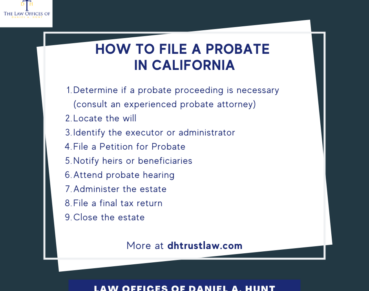Can You Live in the House During the Probate Process in California?
Coping with a loved one’s death is never easy, even when their death is expected. Family members and friends who are left behind have to deal with the emotional loss, but they also have to deal with practical matters such as probate and other legal issues. If you live in a house that will end up going through the probate process, you are probably concerned about whether you will be able to keep living in that house.
Real Estate Going Through the California Probate Process
There is no prohibition against you living in a house that is going through the probate process. Most estate representatives prefer that someone live in a property that is going through probate. First of all, the estate representative can continue to collect rent. Additionally, they can ensure that the resident is maintaining the property.
Suppose the individual who owns the home jointly with other people passed away. One of the first issues that needs to be addressed is how the deceased individual held title to the home. Some titles are owned jointly with the right to survivorship. In these cases, the owner’s interest in the property will automatically transfer to the other surviving owner or owners upon their death. However, when the deceased individual owns the home in their own name exclusively, the estate will go through probate. Unless the home was transferred into a trust, the home would go through probate as part of the estate.
If you live in a home that is going through the probate process, you probably will not be removed until the estate is finalized. Ownership of the home is transferred to a beneficiary or beneficiaries. We will discuss the probate process to understand what steps will need to happen before the homeownership is transferred. The probate process typically takes six to nine months to be completed. Still, that number can vary depending on how complex the estate is and whether any issues arise during the probate process, such as a will contest.
The Executor Will Oversee the Probate Process
The majority of wills name an executor of the estate. The executor is an individual appointed by the creator of the will to administer the estate. The primary responsibility of the executor is to carry out the instructions outlined in the will. The executor should also manage the affairs of the deceased individual’s estate. When the deceased individual did not appoint an executor in their will, the probate court will appoint one.
The executor will need to go through the process of doing due diligence to gather all of the estate assets and locate and pay any outstanding debts. After this process is complete, the executor will look for heirs and beneficiaries of the deceased individual. Finally, the assets owned by the deceased will be given to the beneficiaries named in the will. If there is not a will, the assets will pass to the deceased individual’s next of kin under California’s intestate succession laws.
What if the Home is Heavily Mortgaged?
The executor will have to pay all of the estate’s debts and taxes before distributing the assets. There are other situations in which the estate does not have any other assets apart from the home and has significant debts. In these situations, the executor may need to sell the house, recover the home’s fair market value, and then use the proceeds to pay off creditors of the estate.
If there are no funds to cover the debts, the house will likely transfer to the beneficiaries named in the will. If the deceased did not leave a will, the home would go to the closest family member under California’s intestacy law. Typically, the surviving spouse will take the entire estate. If the deceased was unmarried, their children would receive the property in equal shares.
Renting Out a Probate Property
There are no laws that prevent the estate executor from renting out the probate process. However, whether the executor will do so depends on the situation. If the deceased individual was already renting out the home before he or she died, the lease signed by the tenant and the newly deceased landlord would remain in effect. If the lease expires while the home is in probate, the executor can decide whether to keep renting out the property and sign a new lease or request that the inhabitants leave so he or she can sell the home. The executor will probably consider whether their debts can be paid without selling the home. Additionally, the executor will consider whether there is a specific beneficiary who will inherit the home.
If the property is not being rented out when the homeowner passes away, the executor may decide to rent out the property during the probate process. One of the benefits of doing so involves earning more income to pay the deceased’s bills and creditors during the probate process. The executor can act on behalf of the estate and can decide to rent out the property. The executor will need to make sure that the tenants take care of the property and that it remains well-maintained to benefit the person who will inherit it once probate is complete.
Contact an Experienced Probate Lawyer
Do you have questions about a probate home sale? Would you like to consult with an experienced probate lawyer? Contact the Sacramento probate lawyers at the Law Offices of Daniel A. Hunt to schedule your initial consultation.
Law Offices of Daniel A. Hunt
The Law Offices of Daniel A. Hunt is a California law firm specializing in Estate Planning; Trust Administration & Litigation; Probate; and Conservatorships. We've helped over 10,000 clients find peace of mind. We serve clients throughout the greater Sacramento region and the state of California.




